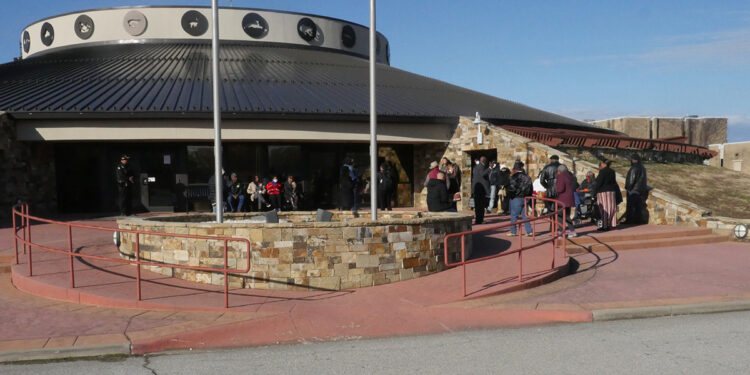“We put on a compelling case, a clear case, a specific case that said that article two of the Creek Treaty of 1866 says ‘Creeks of African descent are entitled to full citizenship rights and benefits as any other Creek,” – Damario Solomon-Simmons
Byline: Braden Harper/Reporter
OKMULGEE, Oklahoma – A jury trial has been scheduled for Apr. 4, 2023, in a civil lawsuit seeking Muscogee Creek Nation citizenship for two Creek Freedmen descendants.
The petition filed with the MCN District Court on Mar. 11 alleges that Rhonda K. Grayson and Jeffrey Kennedy applied for MCN citizenship and were denied.
The petition seeks a declaratory judgment from the court that all Creek Freedmen’s descendants are Creek citizens under Article 2 of the 1866 treaty.
On Dec. 1, a hearing was held on a motion for summary judgment filed by the plaintiffs in the case, but MCN District Court Judge Denette Mouser has yet to issue an order granting summary judgment as of the publication of this update.
Damario Solomon-Simmons, who represents Grayson and Kennedy in the case, spoke to the media after the conclusion of the hearing.
“We put on a compelling case, a clear case, a specific case that said that article two of the Creek Treaty of 1866 says ‘Creeks of African descent are entitled to full citizenship rights and benefits as any other Creek,” Solomon-Simmons said. “That’s the case.”
MCN AG Geri Wisner issued the following statement after the hearing.
“Muscogee (Creek) Special Judge Denette Mouser heard arguments today in the case of Rhonda Grayson and Jeffrey Kennedy vs. the Citizenship Board of the Muscogee (Creek) Nation.
The Plaintiffs’ application for citizenship in the Muscogee (Creek) Nation has previously been denied by the Citizenship Board because petitioners did not meet constitutionally imposed eligibility standards that require demonstrating Creek ancestry by blood. As allowed by Muscogee (Creek) law, petitioners appealed the Board’s decision for administrative review by the Muscogee (Creek) District Court.
The legal scope of today’s hearing was narrowly confined to consideration of the Plaintiffs’ motion for summary judgment requesting a finding that the Citizenship Board had not acted consistent with Muscogee (Creek) law and administrative procedures in denying petitioners’ application for citizenship.”
After a nearly two-hour hearing that featured arguments from the Plaintiffs’ attorneys and the Muscogee (Creek) Office of Attorney General, Judge Mouser stated that she would consider the arguments and issue a ruling at a later date.
“It is clear that the Citizenship Board followed the law in denying Plaintiffs’ applications for citizenship. The Muscogee (Creek) Constitution sets forth clear standards that make no provision for extending citizenship to non-Creek individuals,” Attorney General Wisner said.
Addressing arguments that failure to enroll non-Creek individuals as citizens is discriminatory, Attorney General Wisner said, “Efforts to make this case about race are legally unfounded and morally reprehensible. Race is not a consideration in the citizenship process. Petitioners for citizenship are not asked to identify their race, only to validate their lineage as a Muscogee (Creek) person. This case is about lineage-based citizenship, and any assertion otherwise is blatantly false.”
Pending the outcome of Judge Mouser’s ruling on the motion for the summary judgment, the trial is scheduled to begin on Apr. 4, 2023.
Both parties will now proceed with the discovery process in anticipation of the Apr. 6 trial date.
Mvskoke Media will have ongoing coverage of this developing story.





